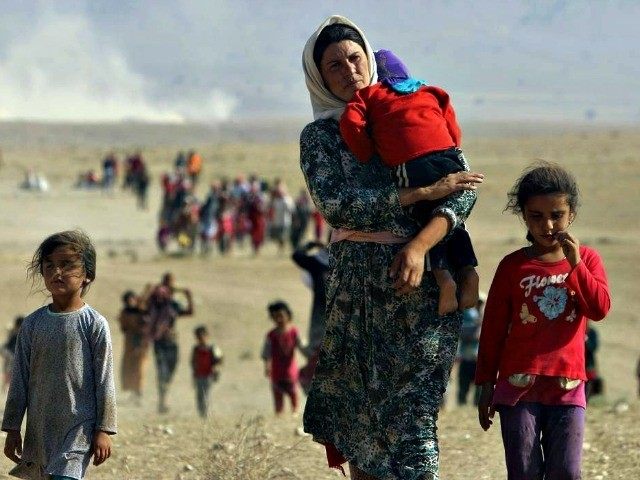House members praised the unanimous passage of the Iraq and Syria Relief and Accountability Act at a press conference on Capitol Hill on Tuesday, a bill that will assess and fund humanitarian efforts to help persecuted Christians and other religious minorities in those terror-torn countries and hold perpetrators accountable.
“Tens of thousands of religious and ethnic minorities in Iraq and Syria continue to face persecution at the hands of ISIS and they need our help now,” Rep. Anna Eshoo (D-CA) said in announcing the bill’s passage. “H.R. 390 will provide urgently needed humanitarian relief to the survivors of what both the Congress and the State Department have labeled as ‘genocide’ and ensure we hold the perpetrators of these crimes accountable.”
Rep. Chris Smith (R-NJ), who co-authored the legislation with Eshoo, said that even though the House passed a resolution in May of 2016 calling the terrorist attacks “genocide” and then-Secretary of State John Kerry officially endorsed the genocide designation, the Barack Obama administration would not allow U.S. funding of faith-based groups that are responsible for much of the humanitarian efforts in those countries.
Under President Donald Trump, that has changed, Smith said, noting that the new administration has said it would support all humanitarian assistance established by the bill, which if subsequently passed by the Senate would become law.
“President Trump and Vice President Pence have strongly, publicly committed the Administration to providing relief to Christians, Yazidis and other genocide survivors, and ensuring perpetrators are brought to justice. H.R. 390 will help ensure that officials implement these commitments and is a blueprint for implementation,” Smith said.
Among the key provisions, H.R. 390 “authorizes and directs the administration to”:
• Fund entities, including faith-based ones, that are effectively providing humanitarian aid on-the-ground to genocide survivors from religious and ethnic minorities;
• Assess and address the humanitarian vulnerabilities, needs, and triggers that might force these survivors to flee.
• Identify warning signs of deadly violence against religious and ethnic minority communities in Iraq or Syria that have been victims of genocide, crimes against humanity or war crimes;
• Support entities conducting criminal investigation into perpetrators of genocide, crimes against humanity and war crimes in Iraq – including collecting and preserving evidence that links specific perpetrators to specific atrocity crimes and is usable in a range of courts; and
• Encourage foreign governments to add identifying information about suspected perpetrators to their security databases and security screening and to prosecute perpetrators.
The press release also said:
Since 2013, Smith has held nine hearings focused wholly or partially on atrocities in Iraq and Syria. Last December, he travelled to Erbil in the Kurdistan region of Iraq to meet with genocide survivors.
“The Chaldean Catholic Archdiocese of Erbil, led by Archbishop Bashar Warda, has been sustaining more than 70,000 Christians who escaped ISIS—almost 1/3 of Christians remaining Iraq—with medical care, food, and shelter and has also served Yazidi and Muslim survivors.
To date, the U.S. has not given a penny for this assistance and only support from organizations like the Knights of Columbus and Aid to the Church in Need has made it possible. The lack of U.S. funding has contributed to chronic funding crises and this aid operation is at-risk of collapsing by the end of the summer, driving survivors out of Iraq forever.
The legislation is supported by many prominent Christian, Yazidi, religious freedom and accountability organizations, as well as by prominent individuals, including all four former U.S. Ambassadors-at-Large for War Crimes Issues.
Smith praised the private sector and faith-based groups that have helped persecuted religious minorities in Syria and Iraq, including the Knights of Columbus, which he said has raised almost $12 million for the humanitarian effort.

COMMENTS
Please let us know if you're having issues with commenting.